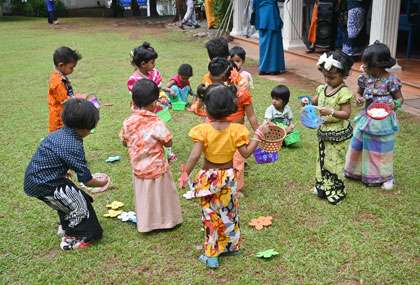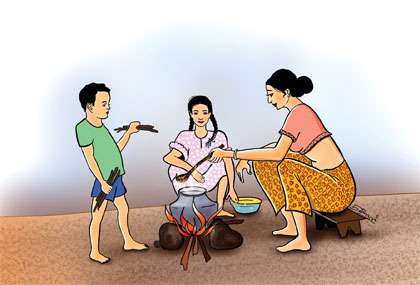Jezima Ismail

A leading and one of the most revered educationists in the country and a champion for human rights and women’s empowerment, she is a lady who needs no introduction. The Commissioner at the Human Rights Commission of Sri Lanka, the past Principal of Muslim Ladies College and a Chancellor at the university level, she is none other than Mrs. Jezima Ismail. Her name is written in golden letters even in the international arena as she was nominated as one of the 500 most influential Muslims in the World. She is a key personality in the inter-religious peace dialogues in Sri Lanka representing the Muslim community as well as social welfare is a voice for the voiceless in the community.
Speaking to Lanka Woman, Mrs. Jezima Ismail expressed her views about the status of women in the Sri Lankan society and how to resolve the problems they face. She also spoke about many issues related to the education sector which she highlighted has not changed for the bettter in the past two decades.
Taking the path of “building relationships” Mrs. Ismail is a strong believer in the conciliatory path to resolve any issue rather than opting for aggression and violence. This was her attitude even with regard to gender-based violence and discrimination against women. “I am of course not someone who believes in the confrontational path. I would think it would be better to have an ‘assertive woman’ rather than an ‘aggressive woman.’ This is my idea of women and I think having worked as a social activist, as human rights activist and as someone who has worked at grassroots levels for the last 50 years, I believe what has made the difference is the path of building relationships and the conciliatory path,” she said. She also felt that protecting the rights of women was not just a responsibly of women but also of men. Men needed to be involved in the process just as much as women, she claimed.
“We used to have women’s organisations where women dealt with women. But I think what is truly necessary is a partnership process. It should be a very inclusive process with the men. Issues like gender equality and gender based violence cannot be resolved unless we have a process which includes men,” Mrs. Ismail pointed out.
Education: Utilisation of knowledge Mrs. Ismail’s first love is education and as an experienced teacher, principal and chancellor, her words on the teaching, learning and the development of children were indeed valuable. “I believe that education should be in charge of educationists. You can’t have people experimenting with education. Education is not just about literacy – reading and writing. It is the utilization of knowledge and this knowledge needs to be utilized correctly. If you tie a lot of books on the back of a donkey – that is education without knowledge,” Mrs. Ismail highlighted. She said that she doesn’t think that there needs to be any changes in the curriculum but what needs to be changed is the way it is taught. For her, preparation was the key to being an excellent teacher. “Whether you have been a teacher for 40 years or just few months, you need to prepare for the class every single day – from your basic lesson plan to even the joke you are going to tell in class. But how many teachers actually do that? How many of them take their classes seriously? I can tell you with my 35 years plus experience teaching that if a class is taught in a proper way, children would never miss a single lesson. Teaching can be made into a living exercise but it is in the hands of the teacher,” Mrs. Ismail pointed out. She is also a firm believer in getting to know the child individually and teaching the students in the best way that benefits and suits them. “One thing I believe is that you don’t teach the lesson; you teach the child. And unless you know the child, it is very difficult to teach. So the first thing the teacher has to do is get to know the child. There is a lot of responsibility on the teacher but it is mainly a process of building relationships,” she declared.
School: an environment to teach as well as to learn Mrs. Ismail felt that the lack of discipline in schools and amongst school children in general were partially the responsibility of teachers and those in charge of the children. She said that cruel punishments, public humiliation and other forms of abuse were being utlised to threaten children instead of guiding them on the correct path. “The custodians and those in charge of the total development of children are completely abusing the system. The fact that the discipline is on a rapid decline is due to this. The teaching and learning process is in the hands of the educationists in the schools which is an enabling environment for children to learn. In other words, a school is not just an environment to teach but it is an environment to learn. And if this is the way that teachers are going to deal with children, the learning is going to be hard,” Mrs. Ismail said. “I have not seen this kind of cruel punishments in the past. Those days, students are called up to the principals’ office for a caning. But it is just a caning. It doesn’t humiliate or degrade the child. It doesn’t destroy the child’s dignity. But now, all the rights of the child are shattered by the way these educationists are behaving. That is the worst kind of thing that can happen to a child and can have a long-lasting effect on the child. That scar, that stigma never goes off,” she added, drawing attention to the negative impact of such thoughtless punishments. Mrs. Ismail also felt that there needs to be some process with more emphasis on psychological, personality, spiritual and moral development of teachers. “It seems to me that some teachers do not know how to deal with human beings,” she said with much regret.
The role of a principal However, it was not only up to the teachers to enlighten children and show them the correct way. The Principals also play a significant role in educating, guiding and disciplining children. “I feel that a Principal should assume more responsibility and more than a resource and financial manager, a Principal should be an effective educational leader. And I believe that a Principal has to teach. Otherwise he or she cannot have their finger in the pulse of the school. When you teach, you build a direct relationship with the children. So at least for a few hours, a Principal should invest their time in teaching. Of course, a Principal has to be in very close touch with the prefects as well.” “Also, continuous study and action research is necessary for a Principal. A Principal cannot give excuses and shy away from this responsibility. If the Principal doesn’t continuously engage in the research process, the system will fall apart,” Mrs. Ismail concluded.
Photographs by Nisal Baduge
Leave a reply
Reply To:
Name - Reply Comment



Comments